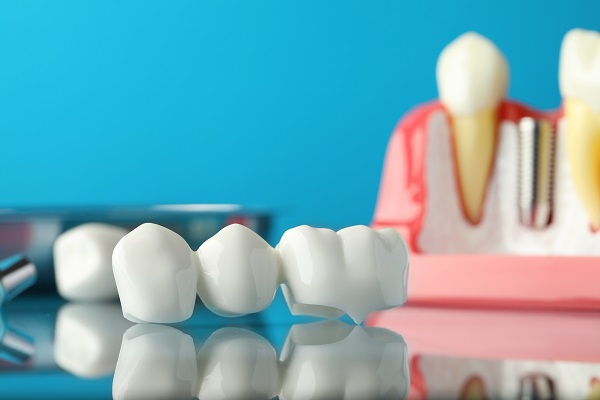What Conditions Would Require Dental Bridges?

Dental bridges are a type of dental restoration for teeth that involve the use of artificial tooth replacement. It can be used to replace missing teeth or in cases where all of an individual's natural teeth have been lost.
The bridge is fixed between two healthy teeth. The bridge spans over this area with crowns on each end. It is supported by metal clasps that attach to the neighboring natural teeth. There are many reasons why people may require bridges. These include extracting one or more (permanent) teeth, loss of a permanent molar due to traumatic injury, periodontal disease, post-extraction alveolar ridge defect, and congenital absence from birth.
Extraction of one or more natural teeth
Extraction of one or more natural (permanent) teeth is a common reason for dental bridges. Dental implants are sometimes a preferable alternative in these cases but depending on what teeth have been lost and other factors such as bone density can make this option too expensive or not possible at all. Suppose you're considering having a bridge to fill your gap. In that case, we recommend that you discuss whether implant replacement is more appropriate.
Dental bridges help fill gaps where tooth loss due to extractions, trauma injury, or periodontal disease. It is fixed between two healthy neighboring teeth on either side of the gap and spans over it with crowns attached at each end supported by metal clasps that attach onto natural teeth around them.
Loss of a permanent molar due to traumatic injury or periodontal disease
Loss of a permanent molar due to traumatic injury or periodontal disease could be why a dental bridge would be necessary. It is crucial to have a dental bridge fitted if you are missing a molar, as it is the tooth that holds other teeth in place and gives your mouth its shape. Molars also help keep food from accumulating between adjacent teeth where bacteria can form and cause gum disease, which will affect your smile and lead to further issues with health such as heart disease, diabetes, etc.
A treatment plan for a bridge would involve removing any decay present on neighboring healthy teeth before crowns (the correct material depends on the severity of damage) are attached. Crowns must be carefully shaped, so it fits together perfectly when pressed down firmly into position at each end after being implanted.
Post extraction alveolar ridge defect
Post extraction alveolar ridge defect is another reason for dental bridges. Dental implants are a more common dental bridge restoration, but in this case, healthy teeth must be removed to make room for the bridge. It can also be used as part of implant treatment that involves dental implants.
Dentists will often recommend dental bridges if:
- You have lost one or several teeth and want to fill these spaces with your own natural looking restored tooth/teeth;
- Your remaining teeth need protection from further decay.
Congenital absence from birth
Congenital absence from birth is another reason for dental bridge treatment. They can be used for cosmetic reasons, such as correcting a gap between your teeth. They are often recommended by dental professionals when a tooth has been lost due to decay or accident and is not going to grow back naturally.
In the case of anterior (front) dental bridge restorations, one false tooth will sit on either side of those spaces;
For posterior (back) dental bridges: two false teeth will fill gaps left after removing several natural teeth - usually molars but sometimes incisors too. The shape and size of a dental bridge should closely match adjacent natural teeth, so it blends in.
Request an appointment here: https://www.appdentalalcoa.com or call Appalachian Dental at (865) 379-7555 for an appointment in our Alcoa office.
Check out what others are saying about our dental services on Yelp: Dental Bridges in Alcoa, TN.
Related Posts
A dental crown is a cap for a damaged or decayed tooth. Crowns can be made from different kinds of materials, each with its own set of pros and cons. It is vital to learn as much as possible about the various dental crown materials. This will help you choose the right option that will…
When the subject of a root canal comes up, people often imagine an unbearable dental procedure that requires a relatively long recovery period. Endodontists perform a root canal when there is an issue such as infection or inflammation, which could cause tooth decay, cracked teeth or continuous treatment of the affected areas. Undergoing a root…
Emergency dentists treat a range of oral health concerns, including toothaches. A minor toothache may not be an emergency, but a severe toothache that lingers for an extended period of time or suddenly worsens likely requires immediate dental care to prevent any additional oral health concerns and ensure ideal long-term oral health. This review highlights how…
Cavities are a common oral health concern that dentists can treat with restorative dentistry. While common, leaving cavities untreated for an extended amount of time can lead to severe complications, including tooth infection, dental abscess, deep tooth decay, and the loss of teeth.The good news is that treating dental cavities is relatively easy for dentists…
